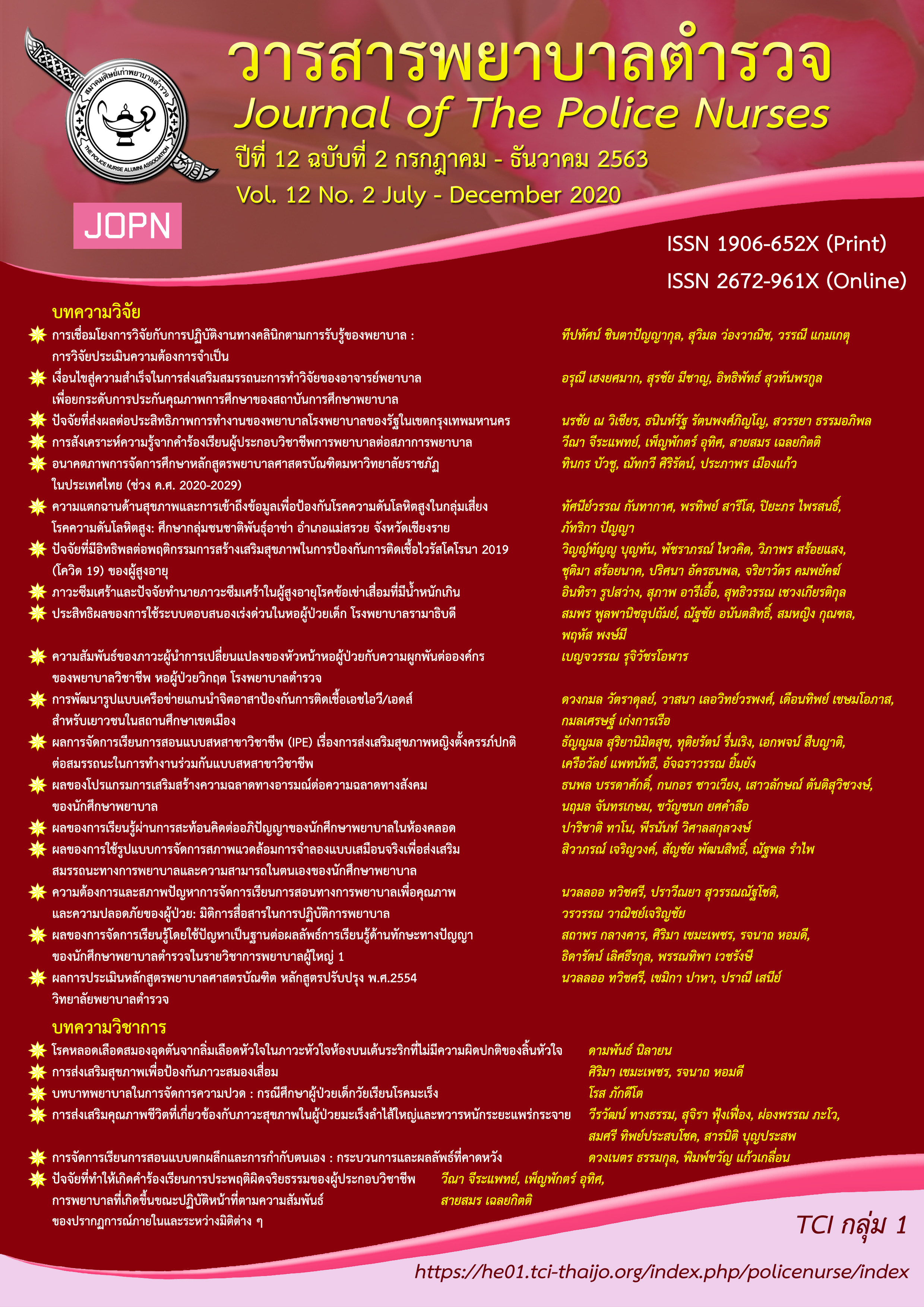THE FACTOR RELATED TO SUCCESSFULLY ENHANCING RESEARCH COMPETENCE AMONG NURSING INSTRUCTORS FOR IMPROVING EDUCATIONAL QUALITY ASSURANCE OF NURSING EDUCATIONAL INSTITUTIONS
Keywords:
successful factors, research competence, nursing instructors, educational quality assuranceAbstract
The purposes of this study were to explore factors related to successfully enhancing research competency among nursing instructors for improving educational quality assurance of nursing educational institutions and to understand the barriers of research practices. A qualitative research methodology was based on a case study approach. The key informants consisted of 9 research experts in nursing education selected by purposive selection from 7 institutions in Bangkok Metropolitan. The data were collected by observation and in-depth interview and examined the content validity by experts. Content analysis was used in this study.
The results revealed that four major themes were related to 1) advisor or mentor 2) time management 3) knowledge and skills in research practice and 4) research network building. Meanwhile, the barriers to research practice included job burnout, a lack of motivation, a long waiting time for approval from the institutional review board (IRB), a lack of management support, an unfavorable climate, and no searching skills. These should be considered by administrators and relevant personnel at all levels and nursing instructors for improvement of competence, educational quality, society, and eventually the nation.
Downloads
References
Bloom, B. S. (1956). Taxonomy of educational objectives, handbook: The cognitive domain. New York, NY: David McKay.
Boonpen, P., Chaijookul, Y., & Yoelao, D. (2018). Research competency and the variables affecting successful research: A case study of national research university. Kasem Bundit Journal, 19(1), 73-88.
Chase, J. D., Topp, R., Smith, C. E., Cohen, M. Z., Fahrenwald, N., Zerwic, J. J., . . . Conn, V. S. (2013). Time management strategies for research productivity. Western Journal of Nursing Research, 35(2), 155-176. doi:10.1177/0193945912451163
Creswell, J. W. (2009). Research design qualitative, quantitative, and mixed methods approaches. Los Angeles: Sage.
Hellsten, L. M. (2012). What do we know about time management? A review of the literature and a psychometric critique of instruments assessing time management. In T. Stoilov, Time management (pp. 1-28). Rijeka, Croatia: Intech.
Jirakangwan, M., & Sarapon, S. (2013). Effects of the development competency research for registered nurses. Medical Journal of Srisaket, Surin, Buriram Hospitals, 28(2), 121-129.
Klayprayong, V. (2015). Strategies of imparting professionalism and the qualification of the mentor to create a new generation of researchers. Hatyai Journal, 13(2), 167-177.
Lincoln, Y. S., & Guba, E. G. (1985). Naturalistic inquiry. Beverly Hills, CA: Sage.
Maneewong, A., Auemaneekul, N., Kalampakorn, S., & Kaewpan, W. (2016). Factors influencing research competency among public health nurses in central region Thailand. Journal of Public Health Nursing, 30(3), 1-15.
Nick, J. M., Delahoyde, T. M., Del Prato, D., Mitchell, C., Ortiz, J., Ottley, C., . . . Siktberg, L. (2012). Best practices in academic mentoring: A model for excellence. Nursing Research and Practice, 2012. doi:10.1155/2012/937906
Office of the National Economic and Social Development Board. (2017). Summary the twelfth national economic and social development plan (2017-2021). Bangkok: Office of the Prime Minister.
Office of the Higher Education Commission. (2017). Manual for the internal quality assurance for higher education institutions 2014. Bangkok: Ministry of Education.
Oyama, Y., Fukahori, H., Miyashita, M., Narama, M., Kono, A., Atogami, F., . . . Yoshizawa, T. (2015). Cross-sectional online survey of research productivity in young Japanese nursing faculty. Japan Journal of Nursing Science, 12, 198-207.
Sambunjak, D., Straus, S. E., & Marušić, A. (2006). Mentoring in academic medicine: A systematic review. JAMA, 296(9), 1103-1115. doi:10.1001/jama.296.9.1103
Siriruk, B. (2016). Educational networking management. Encyclopedia of Education, 51, 6-11.
Sukolpuk, M., Rungsawang, Y., & Chittawisutthiwong, R. (2011). Research situations of nursing instructors of Boromarajonani college of nursing, Chang Wat Nonthaburi. Journal of Health Science Research, 5(2), 51-57.
Sumrit, W., Prachayapruit, A., & Bovornsiri, V. (2015). Development of a mentoring system for developing faculty members, ability to do classroom action research at colleges of nursing under Praboromarajchanok institute, the Ministry of Public Health. Journal of Nursing and Education, 8(2), 67-82.
Thailand Nursing and Midwifery Council. (2019). Certified criteria of institute of nursing and midwifery education 2019. Retrieved from https://www.tnmc.or.th/images/userfiles/files/Accredit%20criteria-2562_revised.pdf
Turner, K., Thummakul, D., Sukolpuk, M., & Sujijantararat, R. (2016). Quality of working life and related factors of nurse educators at central network 1 nursing colleges of Praboromarajchanok institute. Nursing Journal of the Ministry of Public Health, 25(3), 184-198.
Wanchaitanawong, W., Chotika, P., Pipattanawong, W., & Oupra, R. (2011). Coaching strategy for improving research conducted in Boromarajonani college of nursing, Chiang Mai. Rajabhat Journal of Science, Humanities & Social Sciences, 12(2), 122-128.
World Health Organization. (2016). Nurse educator core competencies. Geneva: WHO.
Zelmer, J. (2016). The importance and power of networks in health research, practice and policy. Healthcare Policy, 11(4), 8-9. doi:10.12927/hcpol.2016.24632
Downloads
Published
How to Cite
Issue
Section
License
ผลงานที่ได้ตีพิมพ์แล้วจะเป็นลิขสิทธิ์ของวารสารพยาบาลตำรวจ















